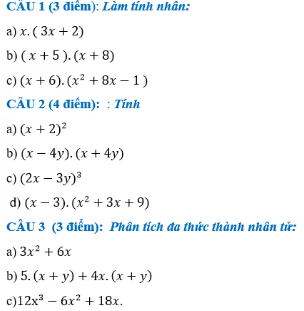
Hãy nhập câu hỏi của bạn vào đây, nếu là tài khoản VIP, bạn sẽ được ưu tiên trả lời.


\(1,\\ a,=3x^2+2x\\ b,=x^2+13x+40\\ c,=x^3+6x^2+8x^2+48x-x-6=x^3+14x^2+47x-6\\ 2,\\ a,=x^2+4x+4\\ b,=x^2-16y^2\\ c,=4x^2-12xy+9y^2\\ d,=x^3-27\\ 3,\\ a,=3x\left(x+2\right)\\ b,=\left(x+y\right)\left(4x+5\right)\\ c,=6x\left(2x^2-x+3\right)\)

\(=\left(x-y\right)\left(x+y\right)+11\left(x-y\right)=\left(x+y+11\right)\left(x-y\right)\)

Ta có: \(x^4-30x^2+31x-30=0\) \(\Rightarrow x^4+x-30x^2+30x-30=0\)
\(\Rightarrow x\left(x^3+1\right)-30\left(x^2-x+1\right)=0\)
\(\Rightarrow x\left(x+1\right)\left(x^2-x+1\right)-30\left(x^2-x+1\right)=0\)
\(\Rightarrow\left(x^2-x+1\right)\left(x^2+x-30\right)=0\)
Xét \(x^2-x+1=\left(x-\frac{1}{2}\right)^2+\frac{3}{4}\ge\frac{3}{4}>0\)
\(\Rightarrow x^2+x-30=0\Rightarrow x^2-5x+6x-30=0\)
\(\Rightarrow\left(x-5\right)\left(x+6\right)=0\Rightarrow\orbr{\begin{cases}x-5=0\\x+6=0\end{cases}\Rightarrow\orbr{\begin{cases}x=5\\x=-6\end{cases}}}\)
Vậy x=5 hoặc x = -6

\(\Leftrightarrow x^4-5x^3+5x^3-25x^3-5x^3+25x+6x-30=0\)
\(\Leftrightarrow\left(x-5\right)\left(x^3+5x^2-5x+6\right)=0\)
\(\Leftrightarrow\left(x-5\right)\cdot\left(x^3+6x^2-x^2-6x+x+6\right)=0\)
\(\Leftrightarrow\left(x-5\right)\left(x+6\right)\left(x^2-x+1\right)=0\)
hay \(x\in\left\{5;-6\right\}\)

(8x-3)(3x+2)-(4x+7)(x+4) = (2x+1)(5x-1)-33
(24x2-9x+16x-6)-(4x2+7x+16x+28) = (10x2+5x-2x-1)-33
24x2+7x-6-4x2-23x-28 = 10x2+3x-1-33
20x2-16x-34 = 10x2+3x-34
<=> 20x2-16x = 10x2+3x
2x2-19x=0
2x(x-19)=0
=>\(\left[{}\begin{matrix}2x=0\Rightarrow x=0\\x-19=0\Rightarrow x=19\end{matrix}\right.\)
Không chắc lắm :)
ở trên đúng r, nhưng sai từ chỗ 2x^2 -19x=0, đáng lẽ phải là 10x^2 -19x =0 mới đúng

Ta có: \(\frac{a+1}{b^2+1}=\left(a+1\right)-\frac{\left(a+1\right)b^2}{b^2+1}\)
\(\ge\left(a+1\right)-\frac{\left(a+1\right)b^2}{2b}=a+1-\frac{ab+b}{2}\)
Tương tự ta có:\(\frac{b+1}{c^2+1}\ge b+1-\frac{bc+c}{2};\frac{c+1}{a^2+1}\ge c+1-\frac{ca+a}{2}\)
Cộng theo vế ta có: \(VT\ge a+b+c+3-\frac{ab+bc+ca+a+b+c}{2}=6-\frac{3+ab+bc+ca}{2}\)
Mà theo BĐT AM-GM: \(ab+bc+ca\le\frac{\left(a+b+c\right)^2}{3}=3\)
Suy ra \(VT\ge6-3=3\)(ĐPCM)

\(\dfrac{x+1}{60}+\dfrac{x+2}{59}=\dfrac{x+3}{58}+\dfrac{x+4}{57}\)
\(\Leftrightarrow\dfrac{x+1}{60}+1+\dfrac{x+2}{59}+1=\dfrac{x+3}{58}+1+\dfrac{x+4}{57}+1\)
\(\Leftrightarrow\dfrac{x+1+60}{60}+\dfrac{x+2+59}{59}=\dfrac{x+3+58}{58}+\dfrac{x+4+57}{57}\)
\(\Leftrightarrow\dfrac{x+61}{60}+\dfrac{x+61}{59}-\dfrac{x+61}{58}-\dfrac{x+61}{57}=0\)
\(\Leftrightarrow\left(x+61\right)\left(\dfrac{1}{60}+\dfrac{1}{59}-\dfrac{1}{58}-\dfrac{1}{57}\right)=0\)
\(\Leftrightarrow x+61=0\)
\(\Leftrightarrow x=-61\)


\(x+y+z=0\Leftrightarrow x^2+y^2+z^2=-2\left(xy+xz+yz\right)\)
Mẫu số nhân ra : \(2\left(x^2+y^2+z^2\right)-2\left(xy+xz+yz\right)=3\left(x^2+y^2+z^2\right)\)
\(A=\dfrac{18\left(x^2+y^2+z^2\right)}{3\left(x^2+y^2+z^2\right)}=6\)